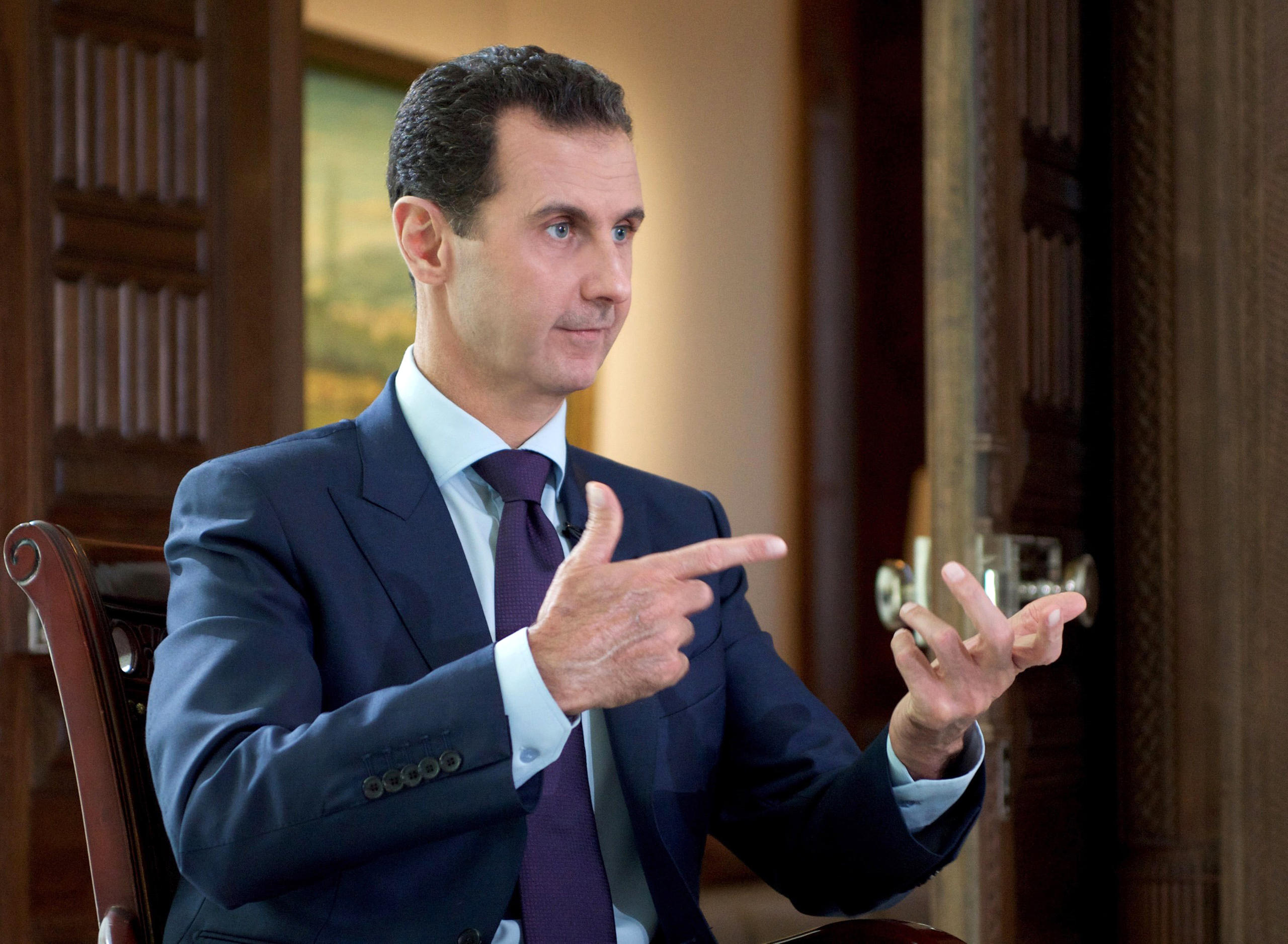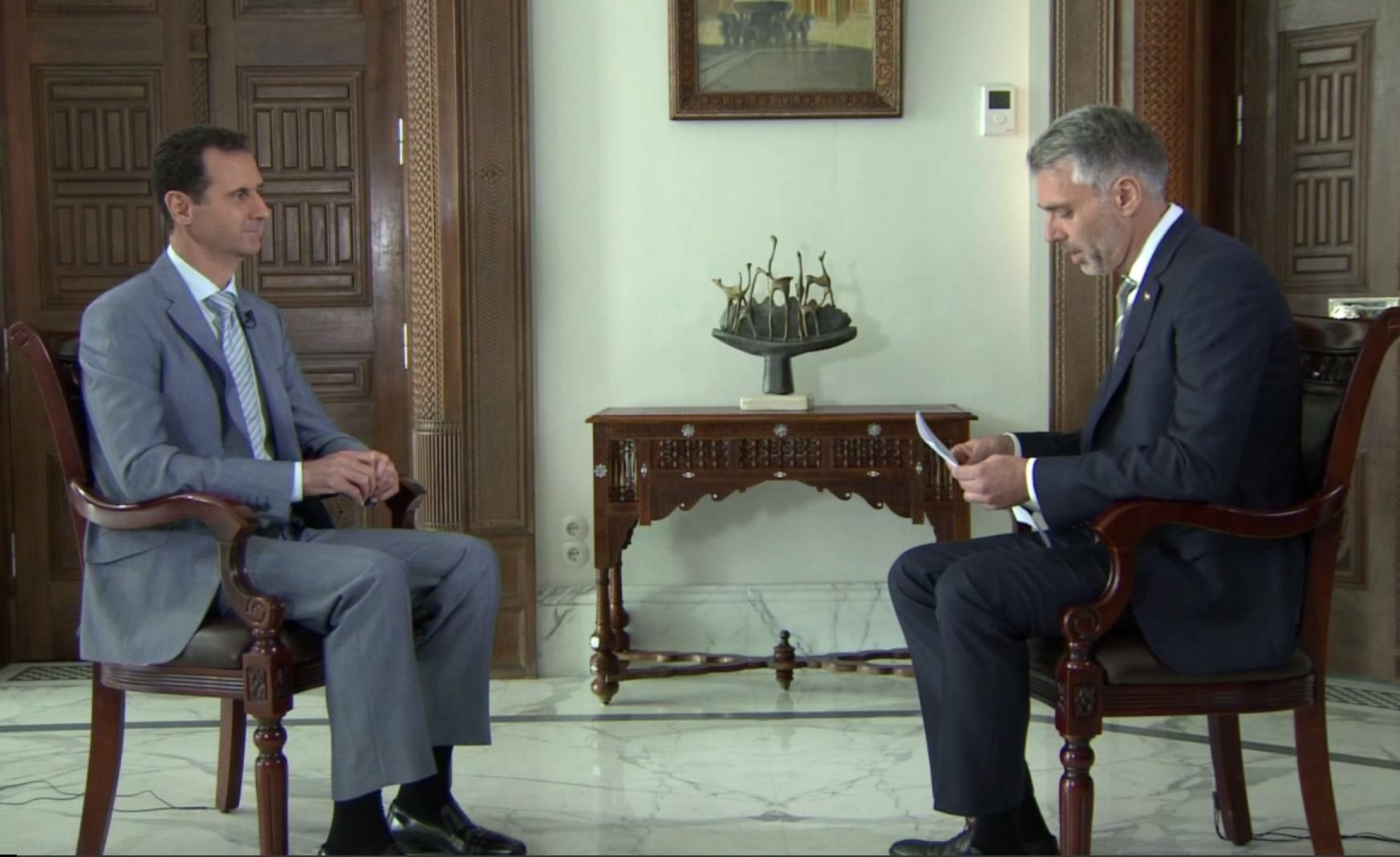
Assad: ‘I’m not attacking people, I’m defending them’

Syria's President Bashar al-Assad told Swiss public television, SRF, that fighting ‘terrorists’ in Aleppo was the only way of ‘protecting civilians’. He denied government forces bombed hospitals indiscriminately and dismissed allegations of the army’s use of chemical weapons.
“According to the constitution, according to the law, we have to protect people, we have to get rid of those terrorists from Aleppo. This is where we can protect the civilians,” Assad told SRF in the interview broadcast on Wednesday.
“How can you protect them while they are under the control of terrorists? They’ve been killed by them, and they’ve been controlled fully by the terrorists. Is it our role to sit aside and watch, if that’s how we can protect the Syrian people? We need to attack the terrorists, that’s self-evident.”
The Syrian military said on Thursday that a unilateral ceasefire backed by Russia had come into force to allow people to leave besieged eastern Aleppo. It’s a move that the rebels have said was part of a psychological campaign to get them to surrender. Intensified Russian and Syrian bombing of besieged rebel-held parts of Aleppo in the last few weeks has hit hospitals, bakeries and water pumping stations, and killed hundreds of civilians.
In the 20-minute interview, Assad said the roles in the conflict were clearly divided, with his government and ‘friends of Syria’ Russia, Iran and China defending the country ‘against the terrorists that have been invading Syria as proxies to other countries’.
The West, meanwhile, wants to depose the government and ‘get rid of a certain president just to bring puppets to suit their agenda’, he added.

More
Bashar al-Assad speaks to Swiss television
Hospitals
The Syrian president denied bombing hospitals or targeting civilians in Aleppo.
“You cannot succeed in your war if you are killing civilians…I’m not asking people to leave Syria, I’m not attacking people; I’m defending the people,” he declared.
He rejected criticism of the army’s indiscriminate use of incendiary weapons and munitions like bunker-buster bombs: “The majority of people were killed by mortars shelled by the terrorists on them while they’re at schools, in their hospitals, in the streets, anywhere. It’s not related to the aerial bombardment.”
He also dismissed United Nations allegations into his army’s use of chemical weapons.
“They haven’t a shred of evidence,” he stated. “They sent one [UN delegation to Syria to investigate] in 2013, and it couldn’t prove at all that the Syrian Army used chemical weapons.”
He said the second UN investigation to Aleppo at the beginning of 2013 into allegations that ‘terrorists used chemical weapons against our army’ was opposed by the US as ‘they already knew that this investigation – of course if it’s impartial – is going to prove that those terrorists, their proxies, used chemical armaments against the Syrian Army’.
Kurt Pelda, a Swiss expert on the Middle East, calls Assad a “pathological liar who is completely detached from reality”. Parts of the Syrian army were attacked with poison gas, he says, but by Syrian government airplanes which accidentally dropped chemical weapons over their own troops. The large attacks on the civilian population came from the regime, according to Pelda. Helicopters dropped bombs containing chlorine gas, which have been extensively investigated by the UN.
Interview conditions
The interview with the Syrian president took place under strict conditions, defined by the government. The talks were filmed by the Syrian government. The Ministry of Information set the duration of the interview in advance (20 minutes). In addition, the conversation had to be broadcast in full length in Switzerland. SRF were allowed to ask questions without having to submit them in advance.
Diplomacy
Assad said he still believed in a diplomatic solution to the conflict, but added that it was impossible to deal with groups like al-Qaeda, al-Nusra and ISIS.
“They have their own ideology, repugnant ideology, so you cannot make political solution with this party; you have to fight them, you have to get rid of them,” he said.
But it is possible to discuss with “political entities” who are “with or against or in the middle”, or with “every militant who is ready to give in his armament for the sake of the security or stability in Syria”.
Diplomatic efforts have been continuing in Switzerland this week. On Thursday, US Secretary of State John Kerry played down expectations of a new Syrian ceasefire deal with Russia after talks in Geneva aimed at agreeing on how to separate al-Qaeda-linked militants from opposition fighters in the besieged city of Aleppo.
After two failed ceasefire agreements between the United States and Russia to end the fighting in Aleppo, a new round of talks includes Saudi Arabia and Qatar, which support Syrian opposition groups. Syria’s ally Iran was not invited.
The Geneva talks follow a meeting between the United States and Arab and European allies on Tuesday that sought to coordinate efforts toward a new ceasefire after Russia – Syrian President Bashar al-Assad’s more powerful ally – unexpectedly announced it had halted air strikes on rebel-held areas of Aleppo.
On Friday, the Geneva-based UN Human Rights Council will hold a special session on the worsening situation in Aleppo after a formal request from Britain, which was made on behalf of a core group of 11 Western and Arab countries, including the United States and regional powers backing Syrian rebel forces.
In a statement, the UN said the special session was needed “following the most recent deterioration of the human rights situation in Aleppo, and the failure of the Assad regime and its allies to fulfil their international human rights commitments”.

In compliance with the JTI standards
More: SWI swissinfo.ch certified by the Journalism Trust Initiative
















![The four-metre-long painting "Sonntag der Bergbauern" [Sunday of the Mountain Farmers, 1923-24/26] had to be removed by a crane from the German Chancellery in Berlin for the exhibition in Bern.](https://www.swissinfo.ch/content/wp-content/uploads/sites/13/2025/12/01_Pressebild_KirchnerxKirchner.jpg?ver=bb19e376)














You can find an overview of ongoing debates with our journalists here . Please join us!
If you want to start a conversation about a topic raised in this article or want to report factual errors, email us at english@swissinfo.ch.